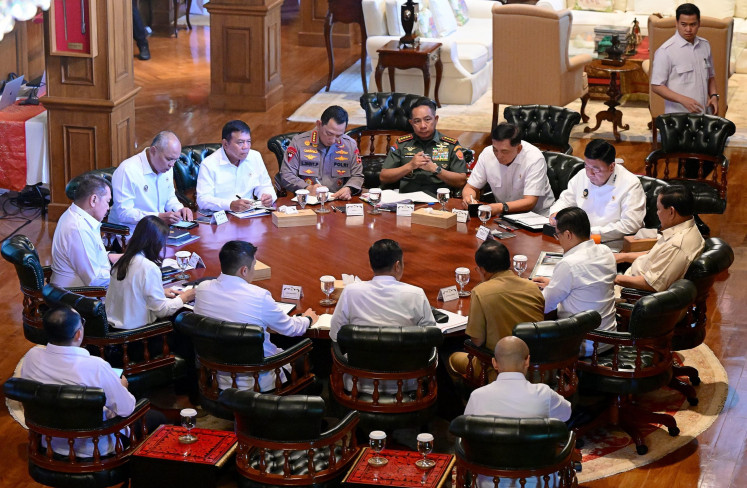Popular Reads
Top Results
Can't find what you're looking for?
View all search resultsPopular Reads
Top Results
Can't find what you're looking for?
View all search resultsIFF gets initial funding commitments
The Islamic Infrastructure Fund (IFF), Asia's first major multi-country Islamic infrastructure fund, has received an initial commitment of US$262 million to help it accelerate the development of infrastructure projects highly needed in developing Asian countries
Change text size
Gift Premium Articles
to Anyone
The Islamic Infrastructure Fund (IFF), Asia's first major multi-country Islamic infrastructure fund, has received an initial commitment of US$262 million to help it accelerate the development of infrastructure projects highly needed in developing Asian countries.
The Asian Development Bank (ADB) and the Islamic Development Bank (IDB) contributed $250 million, while CIMB Group, Malaysia's second largest financial services provider, and Standard Bank, a leading African bank based on Johannesburg, provided $6 million each.
The commitments draw IFF closer to the expected $500 million of initial funding.
CIMB Standard, a joint venture of CIMB and Standard, will act as manager and advisor to the fund, which will make sharia-compliant investment in emerging countries in Asia, targeting significant infrastructure opportunities to meet developmental needs.
The fund will be disbursed to 12 countries, and initially focused primarily on Indonesia, Kazakhstan, Malaysia and Pakistan.
Secondary focus countries will include Afghanistan, Azerbaijan, Bangladesh, Kyrgyz Republic, Maldives, Tajikistan, Turkmenistan and Uzbekistan.
"As the Indonesia's economy is the biggest among the 12 countries and infrastructure demand is high, the potential fund for Indonesia can be quite big," Dato' Sri Nazir Razak, CIMB's group chief executive, said in an interview on Thursday, but refused to elaborate further.
He expected the remaining $238 million could be found within a year.
The initial $500 million deposited with IIF will act as equity for infrastructure projects, which could then be used to attract additional loans to fully finance such projects with a debt-to-equity ratio estimated at 9:1.
The ratio means that the total amount that could be mobilized to finance infrastructure projects with this starting deposit could hit $5 billion, which would be sufficient to start to accelerate development in these 12 Asian countries, said Nazir.
IIF is expected to attract capital from Middle Eastern investors, who are cash-rich from earlier oil revenues, and also from a worldwide range of institutional investors.
The ADB and IDB estimated that the sovereign wealth funds in the Gulf Cooperation Council (GCC) countries currently amounted to about $1.2 trillion at the end of 2008.
CIMB Standard chief executive officer (CEO) Johan Bastin said the fund would be used to invest mostly in power plants, telecommunications and roads.
"Indonesia needs big infrastructure investment for the gross domestic product to grow even faster."
Indonesia's economy is expected to expand 4.6 percent in the second half this year, resulting in full-year growth of about 4.3 percent.
In quarter one, the economy grew by 4.4 percent from a year earlier.
IIF's project investment will range between $25 million and $75 million, but there are no rigid limits, with the annual net IRR for accepted projects (the dollar-weighted internal rate of return, net of management fees and carried interest) targeted at 15 percent with financing exit targeted at four to eight years.
The Indonesian government has said it would spend big on building roads, ports, power plants and other infrastructure projects in the next five years to help boost economic growth and create jobs.
The government plans to finance about 29 percent of a total Rp 1,430 trillion (about US$140 billion) of estimated infrastructure funding during the 2009-2014 period, with the shortfall targeted to come from investors, both local and overseas.
According to a report issued earlier this year by the Swiss-based International Institute for Management Development (IMD), infrastructure in Indonesia remains a crucial problem hampering growth.
In its World Competitiveness Yearbook 2009, IMD says Indonesia needs to improve its infrastructure, despite its fine performance overall, rising from 51st place to 42nd in terms of global competitiveness..
But in terms of infrastructure Indonesia dropped slightly from 51st place in 2008 to 53rd in 2009. IMD surveyed 57 countries worldwide using achievements of each country in 2008 as the basis for its research and to determine indicators.










